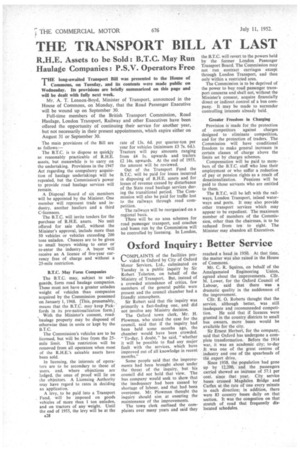THE TRANSPORT BILL AT LAST
Page 30

If you've noticed an error in this article please click here to report it so we can fix it.
R.H.E. Assets to be Sold : B.T.C. May Run Haulage Companies : P.S.V. Operators Free
THE long-awaited Transport Bill was presented to the House of I Commons, on Tuesday, and its contents were made public on Wednesday. Its provisions are briefly summarized on this page and will be dealt with fully next week.
Mr. A. T. Lennox-Boyd, Minister of Transport, announced in the House of Commons, on Monday, that the Road Passenger Executive will be wound up on September 30.
Full-time members of the British Transport Commission, Road Haulage, London Transport, Railway and other Executives have been offered the opportunity of continuing their service for another year, but not necessarily in their present appointments, which expire either on August 31 or September 30.
The main provisions of the Bill are as follows:— The B.T.C. is to dispose as quickly as reasonably practicable of R.H.E. assets, but meanwhile is to carry on the undertaking. Provisions in the 1947 Act regarding the compulsory acquisition of haulage undertakings will be repealed, but the Commission's power to provide road haulage services will remain.
A Disposal Board of six members will be appointed by the Minister. One member will represent trade and industry, another hauliers and a third C-licensees.
The B.T.C. will invite tenders for the purchase of R.H.E. assets. No unit offered for sale shall, without the Minister's approval, include more than 50 vehicles or vehicles exceeding 200 tons unladen. Chances are to be given to small buyers wishing to enter orre-enter the industry. A buyer will receive an A licence of five-year currency free of charge and without a 25-mile restriction.
B.T.C. May Form Companies The B.T.C. may, subject to safeguards, form road haulage companies. These must not have a greater unladen weight of vehicles than companies acquired by the Commission possessed on January 1, 1948. [This, presumably, means that the B.T.C. may keep Pickfords in its pre-nationalization form.] , With the Minister's consent, roadhaulage property may be disposed of otherwise than in units or kept by the B.T.0
The Commission's vehicles are to be licensed, but will be free from the 25mile limit. This restriction will be removed from all operators when most of the R.H.E.'s saleable assets have been sold.
In licensing, the interests of operators are to be secondary to those of users, and, where objections are lodged, the onus of proof will lie on the objectors. A Licensing Authority may have regard to rates in deciding an application.
A levy, to be paid into a Transport Fund, will be imposed on goods vehicles of more than I ton unladen, and on tractors of any weight. Until the end of 1955, the levy will be at the A28 rate of 13s. 6d. per quarter-ton per year for vehicles (minimum £3 7s. 6d.). Tractors will pay atnounts ranging from £4 Is. upwards and trailers 12 14s. upwards. At the end of 1955, the amount will be reviewed.
Out of the Transport Fund the B.T.C. will be paid for losses incurred in disposing of R.H.E. assets and for losses of revenue caused by disturbance of the State road haulage services during the transitional period. The Commission will also be paid for traffic lost to the railways through road com
petition. . The railways will be reorganized on a regional basis.
THere will be no area schemes for road passenger transport, and coaches and buses run by the Commission will be controlled by licensing. In London, the B.T.C. will revert to the powers held by the former London Passenger Transport Board. The Commission may not run contract carriages except through London Transport, and then only within a restricted area.
The Commission is to be deprived of the power to buy road passenger transport concerns and shall not, without the Minister's consent, acquire financially direct or indirect control of a bus company. It may be made to surrender controlling interests already held..
Greater Freedom in Charging Provision is made for the protection of competitors against charges designed to eliminate competition, and for the protection of traders. The Commission will have conditional freedom to make general increases in certain classes of charge above the limits set by charges schemes.
Compensation will be paid to members of the B.T.C. staff who lose their employment or who suffer a reduction of pay or pension rights as a result of denationalization. Pensions will be paid to those servants who are entitled to them.
The B.T.C. will be left with the railways, London Transport, inland waterways and ports. It may also provide other transport services which may appear to be expedient. The maximum number of members of the Commission, other than the chairman, is to be reduced from ten to eight. The Minister may abandon all Executives.




















































































